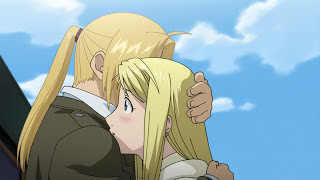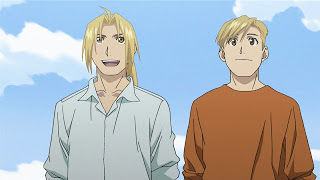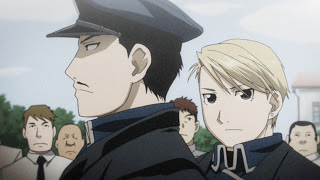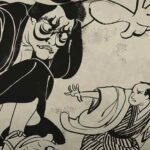Was this a bit of an anti-climax? Well, sure – but in the same way Lord of the Rings earned its long coda, so did “Brotherhood”. After 63 episodes of action, intense drama and enough shared pain for 10 series, 22 minutes or so to send these characters off properly is a deserved indulgence.
I do have a couple of “Bones” with the finale:
– Roy Mustache. I mean – seriously?
– No Major Alex Louis Armstrong.
– What was with Selim/Pride having a nipple on his forehead?
– Apparently one of the effects of Al’s ordeal was that his voice box never dropped. Seriously – it felt odd hearing Kugimiya Rie’s voice coming out of that man-sized body.
Most importantly, I felt Hoenheim deserved a small piece of the action here. I really wanted to see Ed & Al dealing with the loss of the father they’d never really had the opportunity to know in life.
But really, in the end, these were small quibbles. We were allowed to see what we needed to see. Scar got his closure – an opportunity to help Roy rebuild Ishbalan society. This was only fitting as both men still have much to do in terms of atoning for past sins. Marcoh (in a small bit of deux ex machina in a series refreshingly free of it) presents a philosopher’s stone to restore Roy’s eyesight – but not until Roy uses it to heal Havoc. Grumman takes over as Fuehrer, presumably keeping the chair warm for Roy. Madame Bradley has decided to raise Selim, who appears to be progressing as a kind-hearted toddler – but all under the watchful eye of Grumman, who has a polite stare-down with her over the child homunculus’ future in one of the better scenes in the episode.
At the finish, naturally, we loop back to Al & Ed. Ed is without alchemy now, of course, though apparently progressing well enough. After a two-year time jump we see him doing manual labor, wistful but not bitter about what has been lost. Al visits Mrs. Hughes and their daughter, smiling as always but waxing sadly nostalgic over past tragedies. While Al and the chimeras prepare to journey East to Xing and beyond, Ed prepares to journey West – but not before one of the lamest proposals in TV history. Still, Winry accepts – and in the photo montage during the ED we see the results of that partnership. And was it me, or did Mei look awfully chummy with Al in that last photo?
In a way, I’ve very glad to have never r ead the manga – wonderful though I’m sure it is. That ignorance allowed me to be truly, powerfully surprised by this anime. Hiromu Arakawa’s vision was followed faithfully this time, and it was striking how much more sweep and grace the story had as a result. As I’ve mentioned, Arakawa (and Bones) have done a remarkable job weaving together a preposterous amount of plot threads and character relationships. Bones has produced wonderful anime that ultimately stumbled over illogical or impenetrably complex plots (Eureka Seven, Bonen no Xamdou). Due presumably to the source material – but also due to the fact that Bones had 64 episodes to develop the story – FMA: Brotherhood deftly maneuvers through that minefield. Even with so much happening, by the end it all more or less makes sense – even if we didn’t fully understand why at the time. Even more miraculously, at almost no time are we forced to swallow illogical deux ex machina moments, forcing events to match where the story needs to go. It all happens quite naturally.
ead the manga – wonderful though I’m sure it is. That ignorance allowed me to be truly, powerfully surprised by this anime. Hiromu Arakawa’s vision was followed faithfully this time, and it was striking how much more sweep and grace the story had as a result. As I’ve mentioned, Arakawa (and Bones) have done a remarkable job weaving together a preposterous amount of plot threads and character relationships. Bones has produced wonderful anime that ultimately stumbled over illogical or impenetrably complex plots (Eureka Seven, Bonen no Xamdou). Due presumably to the source material – but also due to the fact that Bones had 64 episodes to develop the story – FMA: Brotherhood deftly maneuvers through that minefield. Even with so much happening, by the end it all more or less makes sense – even if we didn’t fully understand why at the time. Even more miraculously, at almost no time are we forced to swallow illogical deux ex machina moments, forcing events to match where the story needs to go. It all happens quite naturally.
As complex as the plot are the myriad relations among the characters. This is a huge ensemble cast – of course the risk is enormous that the narrative will stumble when the story turns to certain of them. But we’re able to leave certain characters for long stretches of time, even Ed & Al, without losing interest in what’s happening. All of these stories are playing our more or less simultaneously, each drawing inexorably closer to each other, until finally they all come together in the fated moment of Father’s choosing. It’s really artfully done.
A word has to be said for the action sequences in the anime version. This is shounen – great shounen – but normally it isn’t the action that primarily piques my interest in an anime. But this series did it’s Bruckheimer moments so beautifully that it was hard not to be impressed – they impact in the same way the action scenes in Gurren-Laggan did. Brotherhood went on about a 20-episode run – peaking with #62 – of violence, noise and intense drama that left me breathless every week. And even by Bones’ standards, the animation quality was consistently great.
Perhaps, again, due to the source material this series represents something of a watershed for Bones. Undeniably one of the best studios in the industry, they nevertheless face consistent problems finishing what they start. Very good series – E7, X’amd, TM8, all written in-house and not adapted – consistently bog down in dead-end plots and rushed (or illogical) conclusions that keep the series from making the final leap from excellence to “masterpiece”. FMA: Brotherhood meets the criteria, it seems to me – and what a pleasant surprise that is. This show ended up being so much more than I expected. It’s smart, deep and full of really big ideas and thoughtful reflections on the contradictions and struggles of life. I expected to like it, to be entertained, to see nice (if inconsistent) escapist entertainment. What I got was a dark, difficult and mature exploration of “equivalent exchange” – viewed though the handy premise of alchemy but really a reflection of the pain of everyday existence. There was drama, incredible action, even poetry. To me, that adds up to a classic.
Revealed in the finale was the news that Bones will be producing a movie as a follow-up to the series. I greet this news with mixed feelings – I liked the way this series ended, and Bones’ efforts with non-canon versions of this story have been less than universally successful. There’s good fodder there – Ed and Winry’s married life, Al’s continued efforts in alchemy, Roy’s quest to heal the world he helped put through hell – but I wonder if they’re better left to the imagination. I’ll certainly be watching and hoping the movie (or movies) provide a relevant addition to the mythology that’s true to the source.






Anonymous
July 5, 2010 at 5:29 amWell done, I agree. I was really bothered by the girl voice coming out of Al's large body, and I was a little disappointed at the exclusion of the chimeras' alchemy conversation, but otherwise it was an amazing wrap-up to an amazing series. As for Mustang – I think a Hughes-style beard would have made more sense. That mustache is just ugly.
Kim
July 5, 2010 at 1:02 pmI did have some issues with Brotherhood as an adaption of the manga but one of my favorite things about this series was seeing people's reactions like yours who did not read the manga. It was great for me to see someone else experience a story I have loved for so long. And I am very glad you enjoyed it.
I am still not sure what I feel about Mustang's blindness being healed by the stone. On one hand it seems too easy and I think it would have been interesting to see what he could accomplish without his sight. On the other hand I like the symbolism of the stone made from Ishvalans used to heal Mustang so he can help the Ishvalan cause. It makes the whole thing come full circle. Also in the manga it was not made clear that Roy used the stone on Havoc.
As for Mei getting chummy with Al I would say so. In fact in the manga Garfiel and Paninya were not in that picture. It was just Ed, Winry, their children, Al, and Mei and it came off more as a family portrait. 🙂
And yeah I am really hesitant about the movie too. Maybe because I just don't see movies of large franchises (from any studio) having good track records. Well I will keep my expectations low and hope to be pleasantly surprised.